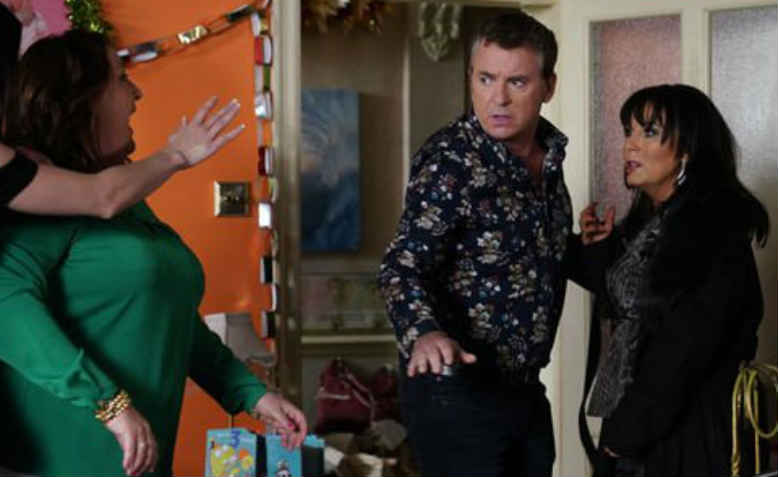 Scene from EastEnders Christmas Special 2018, BBC
Scene from EastEnders Christmas Special 2018, BBC
The producers may stop short at liberal individualism, but Sofie Mason argues that the viewers of EastEnders may reach other conclusions as to what is to be done
From reactions to my last article I know it’s not popular to defend EastEnders but you can’t just dismiss what up to 9 million people watch in the UK for being ‘shouty’. Admittedly, Christmas is a particularly tough time to defend the ear-splitting melodrama that ratchets up during this ‘season of goodwill’ but I will try. After all, whether knowingly or not, the ideal of the family so passionately defended by the right as the bedrock of stability inside capitalism is well and truly torn to shreds every single year to unmask the problems of the rotten society that has moulded it.
You may remember that last year a self-loathing Max, who had conspired against his community, climbed onto the roof of the Queen Vic to throw himself off and, when both of his daughters rushed up to save him, they fell off instead. A couple of years before, Mick ended Christmas lunch punching the living daylights out of his wife’s rapist only to discover the man was his long lost brother by his sister who turned out to be his mother (keep up!). This year it was widely assumed from the trailers that Alfie would be beaten to death with a lead pipe when Kat discovers he has had a love child with her cousin Hayley. As it happens, we now know he’s pushed downstairs, assumed dead, only to recover sufficiently to kidnap his love child and head off, concussed, into the night.
So, putting the histrionics aside and going back to first principles: EE is one of the very few shows that claims to reflect the ordinary lives of working class people. In many ways, it is the modern equivalent of the medieval morality play. I accept that most of the characters are not actually working class but small business people – running cafes, restaurants, market stalls, car lots, funeral parlours etc – which, given the self-employed are only 15% of the workforce in London today, makes them largely unrepresentative. I also accept that it is no accident that nobody is political or left-wing in EE (thanks, BBC!) and so existing politics remains completely unchallenged. But, in the absence of anything better, a working class audience does nonetheless identify with the trials and tribulations of the so-called ordinary folk in Albert Square. EE is important precisely because so many of us watch it “as a means of negotiating and discerning the norms of acceptable social behaviour[i]”.
So what is it telling us about acceptable behaviour? Last time I described the story line of the stabbing of Shakil Kazemi that included the families of real knife-crime victims during the funeral scenes and acknowledged there is no quick-fix to alienated youth. To EE’s credit, the clear message was that individuals are not to blame – not the mothers, not the brothers, not the boys themselves – and individuals on their own cannot unpick the circumstances that lead to these crimes. But the analysis stopped there. It stopped, by implication, on the doorstep of current government – not at a crossroads where there could be some choice in the society that shapes us.
Then, at the end of November, EE ran a hugely lauded episode on what consent means. Given that a recent study conducted by the Family Planning Association for Sexual Health revealed that less than half of people in Britain think it’s OK for a person to withdraw consent if they’re already naked with a partner, this episode was a much needed exploration of what is acceptable after #MeToo. Set entirely in the Queen Vic across one evening of pub chat, the episode explores the relationship between drink and responsibility, the preconceptions about sex from both men and women, consent in marriage, rape fantasies, how history has shaped discrimination, even the different assumptions of innocence if the attacker is black or white and, finally and forensically, whether there are ever really any ‘blurred lines’. By the end, the rape victim Ruby bravely reveals her identity in public and confronts her rapists with “a brave new world, so get used to it!”
Again, EE makes it clear that the individual is not to blame for attitudes towards sex, class and race in society but stops there. Ruby is still left to go to court to prove her individual case. And this Christmas, it is clear that Alfie is not to blame for the flawed and floundering character that he is, unable to understand how much Kat is damaged by the sexual abuse by her uncle in her childhood and hoping that a few white lies will keep everyone happy. And neither is Kat to blame for over-reacting to the discovery of his infidelity and for being the very last person who can forgive deception. “I can’t trust anyone,” she cries, “all smiling at Christmas as if nothing’s happening. Nothing has changed in 40 years!” But even though the producers do stop there, they are not saying “well, that’s just human nature for you and there’s nothing to be done.” I believe, whether they mean to or not, that they leave the viewer wondering whether it isn’t time something did change. Admittedly, there isn’t going to be a revolutionary party meeting in Kathy’s Café any time soon but, when a programme lays out the evidence of how capitalism works with unwitting honesty, doesn’t it give the viewer the chance to form their own conclusions? And the chance for socialists to argue ours? It goes without saying then that, from now on, EE should be compulsory viewing!
[i] John Molyneux, Will the revolution be televised? A Marxist analysis of the media. London: Bookmarks. 2012

